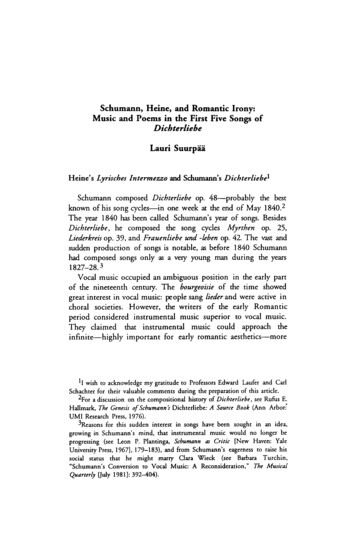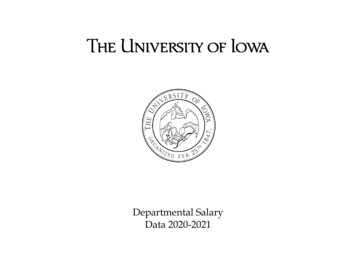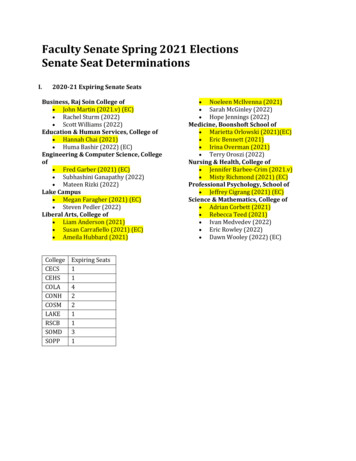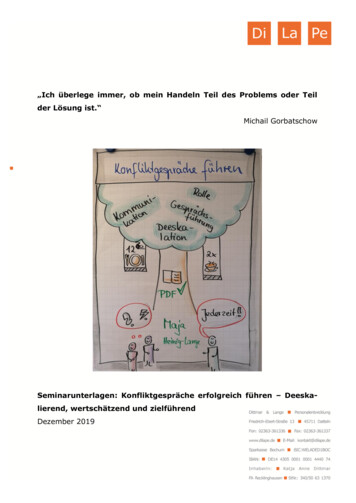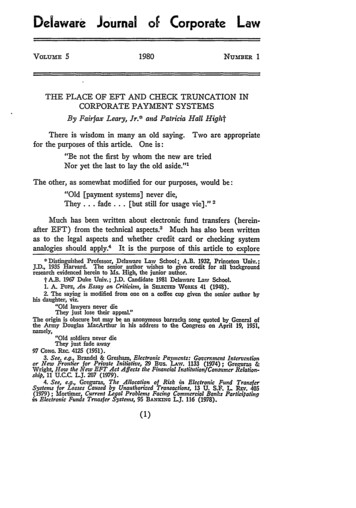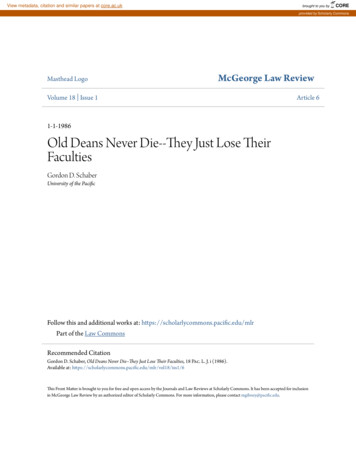
Transcription
View metadata, citation and similar papers at core.ac.ukbrought to you byCOREprovided by Scholarly CommonsMasthead LogoMcGeorge Law ReviewVolume 18 Issue 1Article 61-1-1986Old Deans Never Die--They Just Lose TheirFacultiesGordon D. SchaberUniversity of the PacificFollow this and additional works at: https://scholarlycommons.pacific.edu/mlrPart of the Law CommonsRecommended CitationGordon D. Schaber, Old Deans Never Die--They Just Lose Their Faculties, 18 Pac. L. J. i (1986).Available at: 1/6This Front Matter is brought to you for free and open access by the Journals and Law Reviews at Scholarly Commons. It has been accepted for inclusionin McGeorge Law Review by an authorized editor of Scholarly Commons. For more information, please contact mgibney@pacific.edu.
Old Deans Never Die-They Just LoseTheir FacultiesHon. Gordon D. Schaber*In recent years, as I have become longer of tooth, I found myselfenjoying being the butt of my own little saying which I plagerizedfrom that grand old song, "Old Soldiers Never Die." It was onlythis year that the humor of it all faded somewhat as the McGeorgecommunity looked to the retirement of Dean and Professor FrankJ. Trelease and Professor Glen W. Shellhaas and saw their ascension to the role of the first McGeorge Professors Emeriti.The factors for the approval of law schools of the AmericanBar Association discuss the composition of the faculty and theoverall role that its members should play as that of collectivelyproviding highly competent teaching and contributions to intellectual progress in the law. Also, in the past decade, American legaleducation has been mandated to recognize the importance of practical lawyering skills as an ingredient of the education of everyyoung lawyer.In their roles and activities over the long tenure of their involvement in legal education, Dean Trelease and Professor Shellhaashave each served appropriate faculty roles and made great contributions. Their participation exemplifies my prognostication that thedecade of the 1980's at McGeorge would be one of instructionalexcellence in substance, as well as in lawyering skills and contributions to the language and literature of the law by faculty members who have one foot firmly planted in the classroom and anotherfirmly committed to the significant other endeavors of academia.Frank Trelease has spent his lifetime in academic pursuit. Afteradmission to the bar, and a few years of private practice, he beganto rise in the ranks of the law faculty at the University of Wyoming and became its Dean in 1960. His firm plants in the classroom included basic substantive courses such as torts, civil* Gordon D. Schaber is the Dean of McGeorge School of Law, University of thePacific.
procedure, domestic relations, and equity, in all of which he received the plaudits of class after class as an outstanding teacher.He became known as a renowned environmentalist because of hisdeep interest in the teaching of natural resources in all of its facetsat a time well before any one of us dreamt about the term "environment." In his field, he has become the authority and thelegend. He has become the national and international water lawconsultant, the visiting professor in natural resources throughoutthe world, and the scrivener extraordinare, whether it was a watercode for the United Nations, Jamaica, Swaziland, the Philipines,or California. In California, the late Chief Justice Donald R. Wrightsaid that the proceedings and discussions of the Governor's Commission to Review California Water Rights Law were greatly enriched by the participation of Dean Trelease, because of his nationaland international perspective on these problems.Trelease's Cases and Materials on Water Law will continue asthe premiere work in the field through the good fortune of theMcGeorge faculty having a Trelease protege, Professor GeorgeGould, continuing in the teaching and research of the natural resurce field and as the co-author of this significant work in thearea. The preeminence of our curricular offerings in water andmining law will be continued as the participation in the RockyMountain Mineral Foundation passed from trustee Trelease totrustee, and now President, Gould.Glen W. Shellhaas graduated first in his class at Ohio StateUniversity School of Law and spent 17 years in the successfulprivate practice of law with outstanding ratings from the membersof the profession, the bench, and his clients. His law school Dean,Frank Strong, like most of us on the outlook for outstandinglawyers to serve as adjunct professors, quickly reached out for theservices of Professor Shellhaas. Adjunct teaching ultimately beginsthat conflict of interest, which we try to promote to instill interestin legal education! In this case, it was happily resolved in favorof legal education. And it was a happy coincidence for the growthand development of excellence at McGeorge that Glen W. Shellhaas was brought to the University of Wyoming School of Lawas a professor. Guess who was Dean? Frank J. Trelease, of course.Professor Shellhaas quickly gained teaching strengths in the basiccourses of civil procedure, federal jurisdiction, criminal procedure,commercial law, torts, conflicts of laws, remedies, and commercialcredit. His skills as a trial lawyer caused him to become director
of the Wyoming Defender Aid Program, advisor to the WyomingSupreme Court respecting rules on criminal procedure, and to theWyoming Statute Revision Commission engaged in revising insurance laws. Wherever he went (North Carolina, Texas Tech), hereceived the professor of the year award. He was back at Wyomingwhen we prevailed upon this outstanding classroom teacher withstrong practical lawyering skills to come to McGeorge, where hehas served with devotion and success from 1972.The national visibility of the McGeorge Center for Legal Advocacy, with its unique facilities, including the Courtroom of theFuture, and its excellent trial advocacy program recognized as suchby the first award of excellence in trial advocacy by the AmericanCollege of Trial Lawyers was, in large measure, dependent uponthe devotion and competence of Glen W. Shellhaas.At our Faculty Research and Scholarship Dinner this year, wherewe esecially honored the work of our two colleagues, I made somecomments about the catcalls from the balconies of public opinionthat had been visited upon the calling of the lawyer in his or hervarious capacities over the history of humans. I pointed out thatthe tradition of unappreciated reaction to the calling of the lawyerhas, in its own way, long been true about the calling of the lawprofessor. I was able to recall the little jingle which Professor RudySchlesinger once said was recited by students in Germany:Wenn alles schlaft und einer spright-so nennt man dies denunterricht-it means:When all sleep and one speaks, people call that law instruction.After we introduced student evaluations to be taken at the endof the course, most of us began to learn in a kind of systematicand institutional fashion that students don't wholly appreciate theinstructional efforts of every professor. As one student summed itup: too much pain, too little gain.But may it never be forgotten that, particularly as students become alumni, they have been known to tell me they consider thecalling of the professor to be a grand one. I agree. Indeed, lawteachers do very important things. They get the students into legalmaterials as quickly as possible and force them to, figuratively,stand on their own two feet. Our two retiring professor are mastersin the classrooms. There are students who arrive in law schoolswho are not self-reliant. It is only when they become such thatthey begin to grow in their intellectual prowess and practical lawyering skills. Teachers at their very best, such as Dean Trelease
and Professor Shellhaas, provoke students to reflect on the innumerable vicarious experiences that law materials afford about actuallawyer roles and to derive general lessons from various vicariousexperiences.Great teachers teach skills and perspectives and they inculcatevalues. When teachers are at their very best, they instill, throughexample and precept, habits of care and thoroughness in all thatstudents think and do. The law teacher does not exhaust his orher calling in teaching functional fact alone. To remember and tohonor the services of Dean Frank Trelease and Professor GlenShellhaas is to honor the fact that faculty members organize knowledge about the law, invent new ideas and theories, act as informedcritics, participate in reform efforts, and serve as watchdogs overthe functioning of legal processes.In the case of a professor who develops a special substantivearea of expertise like that of Dean Frank Trelease, the momentthat something goes wrong in the legal order it is not uncommonfor such a law professor to be among the first to rise up and sayso, especially through publication. Dean Trelease has said so. Thecourts have recognized the significance and persuasiveness of histeaching and writing and the summary of his works and its recognition published in this volume is the best evidence of the lustrethat comes to the McGeorge community from our association.We shall miss our day-to-day associations with Frank Treleaseand Glen Shellhaas and the opportunities to be with their delightfulpartners, Mary Trelease and Beth Shellhaas.
Old Deans Never Die--They Just Lose Their Faculties Gordon D. Schaber University of the Pacific Follow this and additional works at:https://scholarlycommons.pacific.edu/mlr Part of theLaw Commons This Front Matter is brought to you for free and open access by the Journals and Law Reviews at Scholarly Commons. It has been accepted for inclusion
